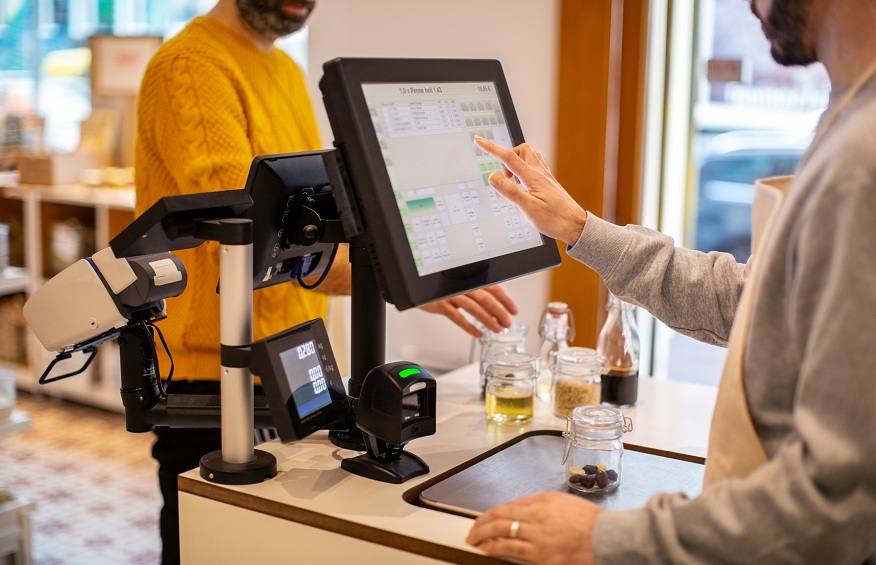In the dynamic world of retail, one technology has captured considerable attention: the Point-of-Sale (POS) system. It has been heralded as a game-changer, poised to revolutionize business operations. But amidst the buzz, a crucial question arises: does the POS system truly live up to its transformative potential, or is it merely another overhyped tech fad?
What is a Point-of-Sale (POS) System?
A POS system is a powerful amalgamation of software and hardware that empowers businesses to seamlessly carry out sales transactions and efficiently manage various aspects of their operations.
With the ability to track sales, inventory, and customer data, and even evaluate employee performance, the sophistication level of the system determines its breadthof functionalities.
Pointofsales systemsarebroadlyclassifiedintotwocategories:traditionaland cloud-based. Traditional POS systems comprise hardware devices that store data locally, while cloud-based POS systems rely on internet connectivity to store data on remote servers.
Whilebothtypessharethesamecorefunctionofprocessingsalestransactions, cloud-based systems offer a more modern approach with added flexibility andscalability.
The POS System as an Industry Game-Changer
There’s no denying that the POS system has brought several changes to the retail industry. Here are some reasons why it’s seen as a game-changer:
● Streamlined Operations
Point of sales systems haverevolutionizedoperationalprocesses,bringinginanewera of efficiency.
The automation of crucial tasks like inventory tracking, sales recording, and customer data management not only saves valuable time but also significantly reduces the chancesofhumanerror.Thisenhancedaccuracytranslatesintoimprovedoverallefficiency, allowing businesses to streamline operations and deliver exceptional customer experiences.
With POS systems at their disposal, organizations can optimize resource allocation, make data-driven decisions, and ultimately drive growth in the ever-evolving marketplace.
● Enhanced Customer Experience
With customer data at their fingertips, businesses can offer personalized experiences, which is a key differentiator in today’s competitive market. POS systems enable businesses to track customerpurchasinghabitsandpreferences,allowingthemtotailor their offerings accordingly.
● Real-TimeData Access
Business owners can easily access real-time dataabouttheiroperationswheneverand wherever they need it, all thankstotheconvenienceofcloud-basedPOSsystems.This seamless integration not only provides valuable insights into various aspects of their business, such as sales, inventory, and customer behavior but also empowers them to make well-informed decisions that drive growth and success.
With the ability to monitor and analyze key metrics in real-time, business owners can stay ahead of the competition and adapt their strategies to the ever-changing market dynamics, ultimately leading to enhanced efficiency, profitability, and customer satisfaction.
Is the POS Syste man Overhyped Tech Fad?
Despite the numerous advantages, there are some compelling arguments suggesting that the POS (Point of Sale) system may be an overhyped tech fad. Critics argue that while the convenience and efficiency of POS systems are undeniable, there are concerns about potential security vulnerabilities and the potential for job displacement as automation continues to advance.
● High Initial Costs
Setting up a POS system can be quite expensive, particularly forsmallbusinessesthat are mindful of their budget.
The costs involved encompass the hardware and software components and the crucial aspectoftrainingstafftoutilizethesystemeffectively.Thisentailsprovidingcomprehensive guidance on how to navigate the system’s features, optimize its functionality, and ensure seamless integration into the business operations.
Thus, while the initial investment may seem daunting, it is important to consider the long-term benefits and increased efficiency that a well-implemented POS system can bring to the business.
●Dependence on Internet Connectivity
Most modern point of sale (POS) systems heavily depend on a stable internet connection for seamless operations.
Therelianceoninternetconnectivityensuresefficientprocessingoftransactions, real-time inventory management, and streamlined communication between different parts of the business. However, any disruption or instability in the internet connection can potentially result in significant operational issues, such as delays in transaction processing, inaccurate inventory updates, and interrupted communication channels.
● Data Security Concerns
Given the amount of sensitive data POS systems handle, they are attractivetargetsfor cybercriminals. Businesses need to invest in robust security measures to protect this data, adding to the overall cost.
The Verdict
While there are some valid concerns about the POS system, calling it an overhypedtech fad may be too harsh. The benefits it offers, such as streamlined operations, enhanced customer experience, and real-time data access, are substantial and can significantly improve business performance.
However, like any technology, a POS system is notamagicbullet.Itshouldbeseenas a tool that, when used correctly, can bring about significant improvements. Businesses should carefully consider their specific needs and resources before investing in a POS system.
In conclusion, the POS system is more than just a passing tech trend. It’s a powerfultool that has already proven its value in the retail industry, and with continuous technological advancements, its influence is likely to grow even more in the future.


